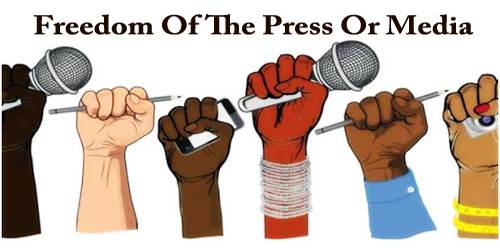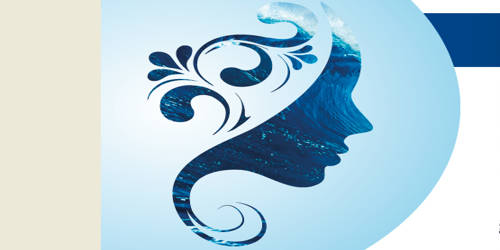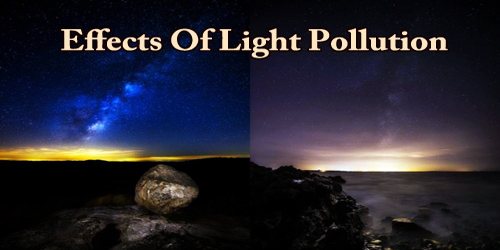Freedom of the press or freedom of the media is the right to circulate opinions in print and electronic media, especially published materials, without censorship by the government. Such freedom implies the absence of interference from an overreaching state; its preservation may be sought through constitution or other legal protection and security. Americans enjoy freedom of the press under the First Amendment to the Constitution, which states: ‘Congress shall make no law…abridging the freedom of speech or of the press.’
With respect to governmental information, any government may distinguish which materials are public or protected from disclosure to the public. State materials are protected due to either of 2 reasons: the classification of information as sensitive, classified or secret, or the relevance of the information to protecting the national interest. Many governments are also subject to “sunshine laws” or freedom of information legislation that are used to define the ambit of national interest and enable citizens to request access to government-held information.
The First Amendment, which protects freedom of the press, was adopted on December 15, 1791, as part of the Bill of Rights. The Bill of Rights provides constitutional protection for certain individual liberties, including freedom of the press, freedom of speech, freedom of religion and the right to assemble and petition the government.
The United Nations’ 1948 Universal Declaration of Human Rights states: “Everyone has the right to freedom of opinion and expression; this right includes freedom to hold opinions without interference, and to seek, receive, and impart information and ideas through any media regardless of frontiers”.
This philosophy is usually accompanied by legislation ensuring various degrees of freedom of scientific research (known as scientific freedom), publishing, and press. The depth to which these laws are entrenched in a country’s legal system can go as far down as its constitution. The concept of freedom of speech is often covered by the same laws as freedom of the press, thereby giving equal treatment to spoken and published expression. Sweden was the first country in the world to adopt freedom of the press into its constitution with the Freedom of the Press Act of 1766.
History –
Back in 1735, there was a case involving John Peter Zenger, a journalist, and publisher of the New York Weekly Journal. Zenger was sued for libel after publishing critical stories about public officials, but this famous case was overturned. This case established the right of the press to criticize public officials, and it also indicated that true statements are a valid defense when sued for libel. Thereafter, in 1791, the First Amendment was established. This Amendment is the basis of the freedom of the press.
During the early 1900s and World War I, two legislative acts were passed to regulate free speech. These acts, the Espionage Act and the Sedition Act were enacted in order to censor pro-German, socialist, or pacifist publications. However, in 1931, the Supreme Court held that virtually all forms of restraint on free speech were unconstitutional.
In the advent of the Cold War in the mid-1900s, news organizations worked to disclose information such as public records relating to wars. These efforts were designed to promote the policy that failing to release information to the public constitutes a threat to the freedom of the press.
Central, Northern, and Western Europe has a long tradition of freedom of speech, including freedom of the press. After World War II, Hugh Baillie, the president of United Press wire service based in the U.S., promoted freedom of news dissemination. In 1944 he called for an open system of news sources and transmission, and minimum of government regulation of the news. His proposals were aired at the Geneva Conference on Freedom of Information in 1948 but were blocked by the Soviets and the French.
Media freedom is a fundamental right that applies to all member states of the European Union and its citizens, as defined in the EU Charter of Fundamental Rights as well as the European Convention on Human Rights. Within the EU enlargement process, guaranteeing media freedom is named a “key indicator of a country’s readiness to become part of the EU”.
Thereafter, in the early 1970s, during Vietnam and the Nixon administration, frequent discussions occurred between news agencies and the government. In 1971, a Supreme Court case entitled New York Times v. United States established the significant rights of the press. In this case, the government sought to suppress classified documents known as the Pentagon Papers. These papers included classified information about the Vietnam War. The New York Times fought against the government’s effort to prevent publication, and the Supreme Court upheld the freedom of the press and its First Amendment rights to speech. Thus, the Pentagon Papers were released.
Relationship to self-publishing –
Freedom of the press is not construed as an absence of interference or outside entities, such as a government or religious organization, rather as a right for authors to have their works published by other people. This idea was famously summarized by the 20th century American journalist, A. J. Why, who wrote, “Freedom of the press is guaranteed only to those who own one”. Freedom of the press gives the printer or publisher exclusive control over what the publisher chooses to publish, including the right to refuse to print anything for any reason. If the author cannot reach a voluntary agreement with a publisher to produce the author’s work, then the author must turn to self-publishing.
Life Risks Situation of Journalists –
Each year, The Committee to Protect Journalists produces a comprehensive list of all working journalists killed in relation to their employment, including profiles of each deceased journalist within an exhaustive database, and annual census of incarcerated journalists (as of midnight, December 1). The year 2017 reported record findings of jailed journalists, reaching 262. Turkey, China, and Egypt account for more than half of all global journalists jailed.
As per a 2019 special report by the Committee to Protect Journalists, approximately 25 journalists were murdered on duty in the year 2019. The figure is claimed to be the lowest since 2002, a year in which, at least 21 journalists were killed while they were reporting from the field. Meanwhile, Reporters Without Borders (RSF), reported 49 killings, the lowest since 2003 when almost 36 journalists were killed. Leading press watchdogs fear persisting danger for the life of journalists. The drop in the murder of in-field journalists came across during the “global attention on the issue of impunity in journalist murders”, focusing on the assassination of Saudi journalist Jamal Khashoggi in October 2018 and Daphne Caruana Galizia, a Maltese blogger in October 2017.
Press Freedom Around The World –
In 2017, a U.S.-based nonprofit, Freedom House, found that just 13 percent of the world’s population enjoys a free press a media environment where political news coverage is robust and uncensored, and the safety of journalists is guaranteed.
The world’s 10 worst-rated countries and territories include: Azerbaijan, Crimea, Cuba, Equatorial Guinea, Eritrea, Iran, North Korea, Syria, Turkmenistan, and Uzbekistan.
The United States ranked 37 of 199 countries and territories for press freedom in 2017. Norway, the Netherlands, and Sweden were the top ranking countries.
Many of the traditional means of delivering information are being slowly superseded by the increasing pace of modern technological advance. Almost every conventional mode of media and information dissemination has a modern counterpart that offers significant potential advantages to journalists seeking to maintain and enhance their freedom of speech. Naturally, governments are responding to the challenges posed by new media technologies by deploying increasingly sophisticated technology of their own (a notable example being China’s attempts to impose control through a state-run internet service provider that controls access to the Internet) but it seems that this will become an increasingly difficult task as journalists continue to find new ways to exploit technology and stay one step ahead of the generally slower-moving government institutions that attempt to censor them.
Information Sources:
















